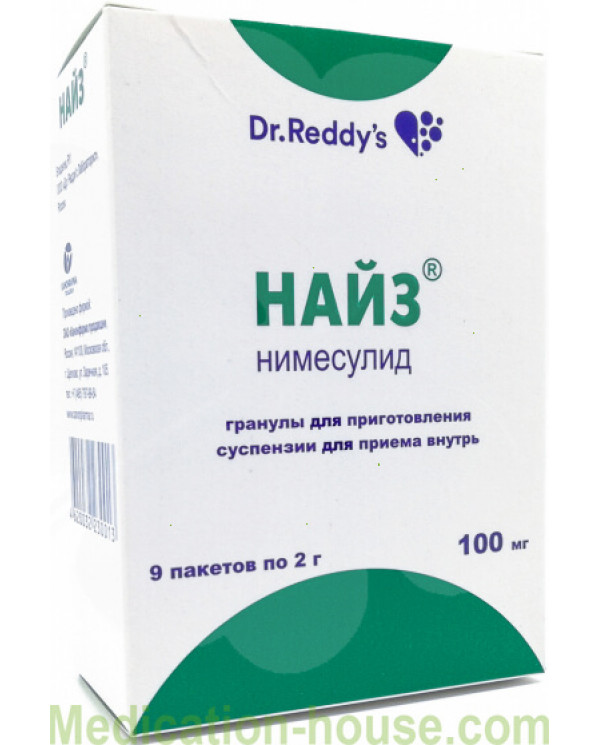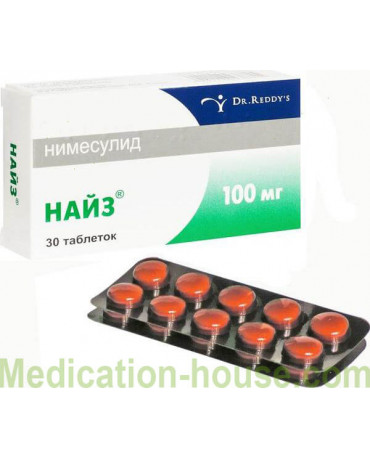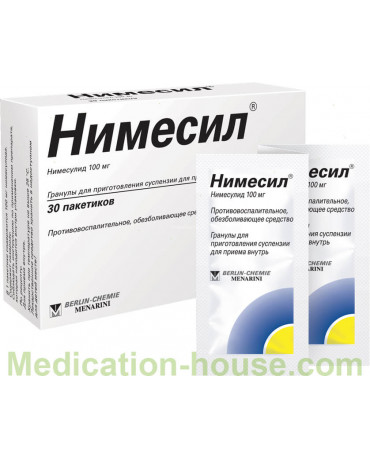Nise granules user manual
Reed more and buy Nise granules on this page
pharmachologic effect
NSAIDs, in the structure of which there is a sulfonylide group. Nimesulide is believed to be a selective COX-2 inhibitor. It has a pronounced anti-inflammatory, as well as analgesic and to a lesser extent antipyretic effect. The mechanism of action is associated with inhibition of prostaglandin synthesis. Inhibits the synthesis of prostaglandins in the area of inflammation to a greater extent than in the gastric mucosa or kidneys, which is caused mainly by inhibition of COX-2.
In addition, in the mechanism of the anti-inflammatory action of nimesulide, its ability to suppress the formation of free oxygen radicals (without affecting hemostasis and phagocytosis) and inhibit the release of the myeloperoxidase enzyme is important.
Pharmacokinetics
After ingestion, nimesulide is well absorbed from the gastrointestinal tract, Cmax in the blood plasma is achieved in 1-2 hours.
Protein binding is 99%. After ingestion of a single dose of 100 mg, nimesulide is present in the tissues of the female genital organs at a concentration of 40% of the concentration in plasma.
It is metabolized in the liver, the main metabolite hydroxynimesulide has pharmacological activity.
T1 / 2 of plasma is 2-3 hours.
Excreted mainly from the body with urine, about 98% of the dose is excreted within 24 hours. With prolonged therapy, nimesulide is not cumulated.
Indications
Osteoarthritis, extra-articular rheumatic diseases, pain and inflammation after surgery, pain and fever in acute inflammatory processes in the upper respiratory tract, pain associated with dysmenorrhea.
Contraindications for Nise granules
Peptic ulcer and duodenal ulcer in the acute phase, acute bleeding from the gastrointestinal tract, moderate and severe liver failure, renal failure (CC less than 30 ml / min), pregnancy, lactation; hypersensitivity to nimesulide and other NSAIDs (including acetylsalicylic acid).
Side effects of Nise granules
On the part of the digestive system: heartburn, nausea, stomach pain; in some cases - tarry stools, melena (associated with bleeding and erosive and ulcerative lesions of the gastrointestinal tract).
From the side of the central nervous system: rarely - headaches, dizziness, drowsiness.
Allergic reactions: skin rash, erythema, urticaria.
Other: rarely - oliguria, fluid retention, local or systemic edema; in some cases - thrombocytopenic purpura.
special instructions
With caution Nise granules should be used orally in patients with impaired renal function, with hypertension, with disorders of the heart, visual impairment.
When applied externally, the physician’s control over the condition of elderly patients with impaired renal function, liver, and congestive heart failure is required.
When Nise granules used in pediatrics should use dosage forms intended for children. In children under 6 years of age when nimesulide is used externally, medical supervision is required.
Influence on ability to drive motor transport and control mechanisms
Due to the fact that Nise granules can be dizziness and drowsiness when administered by ingestion, it should be used with caution in patients engaged in potentially hazardous activities that require increased concentration of attention and quick psychomotor reactions.
With renal failure
Nise granules contraindicated in renal failure (CC less than 30 ml / min).
In violation of the liver
Contraindicated in moderate and severe liver failure.
The elderly
When applied externally, the physician’s control over the condition of elderly patients with impaired renal function, liver, and congestive heart failure is required.
Use during pregnancy and lactation
Nise granules are contraindicated for use during pregnancy and lactation.
There is no direct indication of the embryotoxic and tocolytic effects of Nise granules.
Drug interactions
Possible manifestations of drug interactions with simultaneous ingestion of nimesulide with digoxin, phenytoin, lithium preparations, diuretics, antihypertensive drugs, other NSAIDs, anticoagulants, cyclosporine, methotrexate, oral hypoglycemic agents.
Mode of application
Nise granules are taken orally, 1 sachet (100 mg of Nimesulide) twice a day. Nise granules are recommended to be taken after meals. The contents of the bag are poured into a glass and dissolved in about 100 ml of water (a white to light yellow suspension is formed). The prepared solution is not subject to storage.
Nise granules are used only for the treatment of patients over 12 years old.
Adolescents (12 to 18 years old): Based on the pharmacokinetic profile and pharmacodynamic characteristics of nimesulide, there is no need to adjust the dose in adolescents.
Patients with impaired renal function: based on pharmacokinetic data, there is no need to adjust the dose in patients with mild and moderate severity of renal failure (creatinine clearance 30-80 ml / min).
Elderly patients: in the treatment of elderly patients, the need for adjusting the daily dose is determined by the doctor based on the possibility of interaction with other drugs.
The maximum duration of treatment with nimesulide is 15 days.
To reduce the risk of unwanted side effects, use the minimum effective dose of the minimum short course.
Terms of sell
You can buy Nise granules without a prescription.



